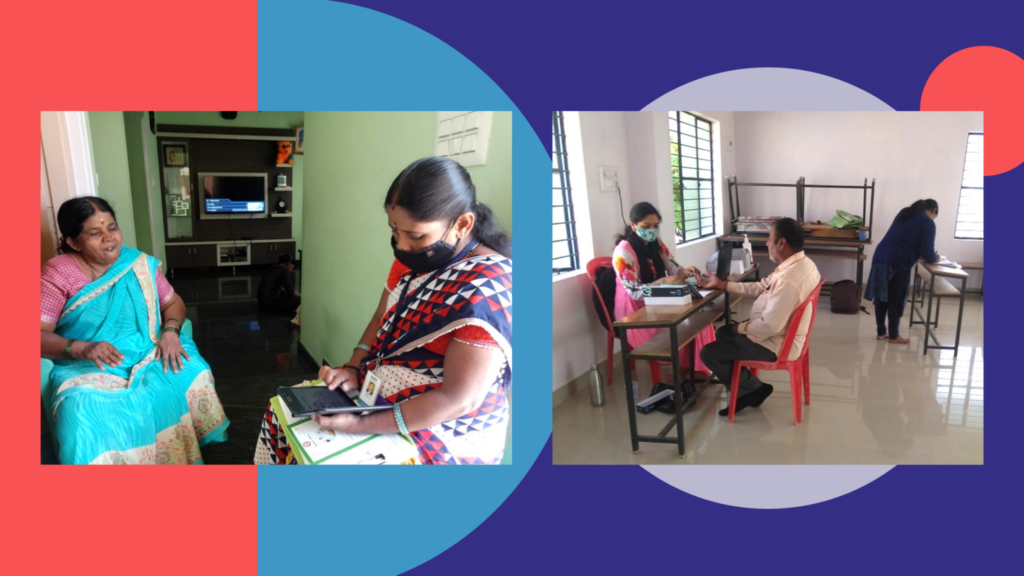Overview
The geographically diverse state of Karnataka in South India is home to the Karnataka Health Promotion Trust (KHPT), a charitable trust that conducts pioneering work in healthcare delivery. KHPT was founded in 2003 by the Karnataka State AIDS Prevention Society and the University of Manitoba with a single mission: to reduce the prevalence of HIV in the state. Its success at achieving this goal has seen the initiative scale to national and global levels.
Besides HIV, KHPT has evolved to pioneer innovative responses to a range of healthcare challenges in the domain of maternal, neonatal, child, and adolescent health, tuberculosis, and comprehensive primary health care. KHPT’s programs stand out for an informed approach through rigorous evidence gathering and are supported by grassroots community connections and strong government relationships.
These attributes caught the attention of Medtronic Foundation, which partners with organizations to improve the health of underserved populations and to support communities where Medtronic employees live and work. A pillar of the foundation’s work has been to strengthen health systems and empower employees to positively impact local communities through their skills, time, and resources.
Since 2017, KHPT has been pioneering a health system-centric model to improve the NCD care continuum in Mysore, India. Against this backdrop, the Medtronic Foundation collaborated with KHPT to leverage its existing efforts on improving the non-communicable disease (NCD) continuum of care and supplement it by bringing improved patient-centricity into the model. The project aimed to develop an innovative community health worker (CHW) model embedded within the existing urban health system to achieve improved NCD outcomes for a minimum of 60% of the population with a focus on the underserved.
The effort falls under KHPT’s comprehensive primary healthcare thematic area to provide personalized patient-centered care for urban populations, with a focus on marginalized communities. As part of this project, KHPT tested the feasibility of employing a team of CHWs and building their capacities on the use of a comprehensive mobile-based software to assess patients’ health risks, vulnerabilities, and healthcare needs.
The Challenge
Results from the earlier health system-centric NCD project indicated that many patients were not under biological control for diabetes and hypertension despite regular visits to care facilities for treatment. Qualitative studies revealed several reasons for this, including that patients feared the side effects of prescription medications, had misconceptions about how to adhere to their treatments, and held false beliefs about self-care practices.
To overcome these challenges, the NCD project developed a data collection system that was intended to track information regarding patients’ healthcare needs and CHWs’ performance. However, the legacy software used was severely limited in functionality, and CHWs and program management teams failed to collect the necessary data.
Through the Medtronic Foundation Global Innovation Fellows program with support from Pyxera Global, a Medtronic employee volunteer team helped redesign the patient management software that CHWs used during patient consultations. The aim of the redesign was to improve functionality to support CHWs in enhancing patient-centric care. The improved software would allow for comprehensive patient risk assessments and help the program team supervise CHWs and measure their performance, as well as that of project officers.
Global Innovation Fellows’ Response
To support its mission, Medtronic Foundation connects skilled employee teams – termed Global Innovation Fellows (GIFs) – to work with partner organizations. These fellows are among the company’s top talent and they work on immersive consulting projects that give them a unique opportunity to impact global health.
In November 2020, six Medtronic India GIFs, based out of four different locations, joined the NCD project and were assigned to work with KHPT. The team of three women and three men connected virtually and embarked on the challenging capacity-building project.
Meeting for an hour daily, the GIF team focused on three areas: people, process, and technology. They conducted a detailed SWOT analysis, uncovering threats including network issues and preventing loss to patient follow-up. Using a human centered-design approach, the team introduced a five-phase journey, consisting of building empathy, defining the problem, ideating solutions, prototyping deliverables, and testing results with humans at the core. They held virtual meetings with CHWs as part of the ideation phase and reworked the user interface (UI) to enhance user experience (UX).
While doing so, the GIFs used gamification to drive intuitive thinking, decision making, and data capture. After several interactions with the CHWs, the team developed a prototype solution that formed the crux of its final deliverable. By the project’s conclusion in late March 2021, the team had provided recommendations on functional specifications, user design, the “to-be” enterprise architecture (i.e., the recommended future architecture as opposed to the current “as-is” architecture), evaluation of data technologies, and a presentation of solution prototype designs.

Project Outcomes
As a result of the project, CHWs will find data collection easier than before, enabling them to spend more time on insightful engagement with patients that will reduce the number of interactions needed. A real-time digital dashboard will enhance CHWs’ self-service analytics capabilities, while simplified and strengthened behavior change communications will lead to better lifestyle practices and adherence to medication. The GIF team also identified 20 key performance indicators (KPIs) to monitor ongoing performance.
Conclusions and Looking Ahead
Before COVID-19, Medtronic’s GIFs undertook projects in person, a key feature of the fellowship that encouraged relationship-building among the employees and the host organization. However, the pandemic forced Medtronic Foundation to pivot and create virtual opportunities instead. This NCD project demonstrated how effectively a remote team could function and continue to work with a partner organization with impactful results.
The adage “when the going gets tough, the tough get going” perfectly encapsulates the experience of the Medtronic Foundation GIF program. Although in-person engagements will undoubtedly return post-pandemic, the success of virtual projects such as this suggests it’s entirely probable that a hybrid model with in-person and virtual elements will prevail. This project was an eye-opener and trendsetter that will significantly shape the future of pro bono.

